Critical Analysis: IHRM Article on Expatriates in Vietnam
VerifiedAdded on 2022/12/26
|13
|3740
|65
Report
AI Summary
This report presents a critical analysis of the article "Towards a theory of effective cross-cultural capacity development: the experiences of Australian international NGO expatriates in Vietnam" by Fee, Heizmann, and Gray (2017). The review examines the article's research paradigm, focusing on its inductive approach and exploration of IHRM issues within the context of international NGOs. It delves into the authors' literature review, highlighting the challenges faced by expatriates and the importance of capacity development. The analysis covers the methodology, sampling, and key findings, including the significance of intergroup interactions, trust-building, and relational demography in cross-cultural settings. The report also considers the implications of the study for IHRM practices, particularly in addressing the complexities of expatriate-host country national relationships and the challenges of capacity development in international contexts. Furthermore, the report considers the role of institutional theory, legitimacy, and the impact of demographic differences within organizations, offering insights into the practical implications for managing human resources in global organizations. The report offers a comprehensive overview of the article's contributions to the field of IHRM and its relevance to current challenges in international business.
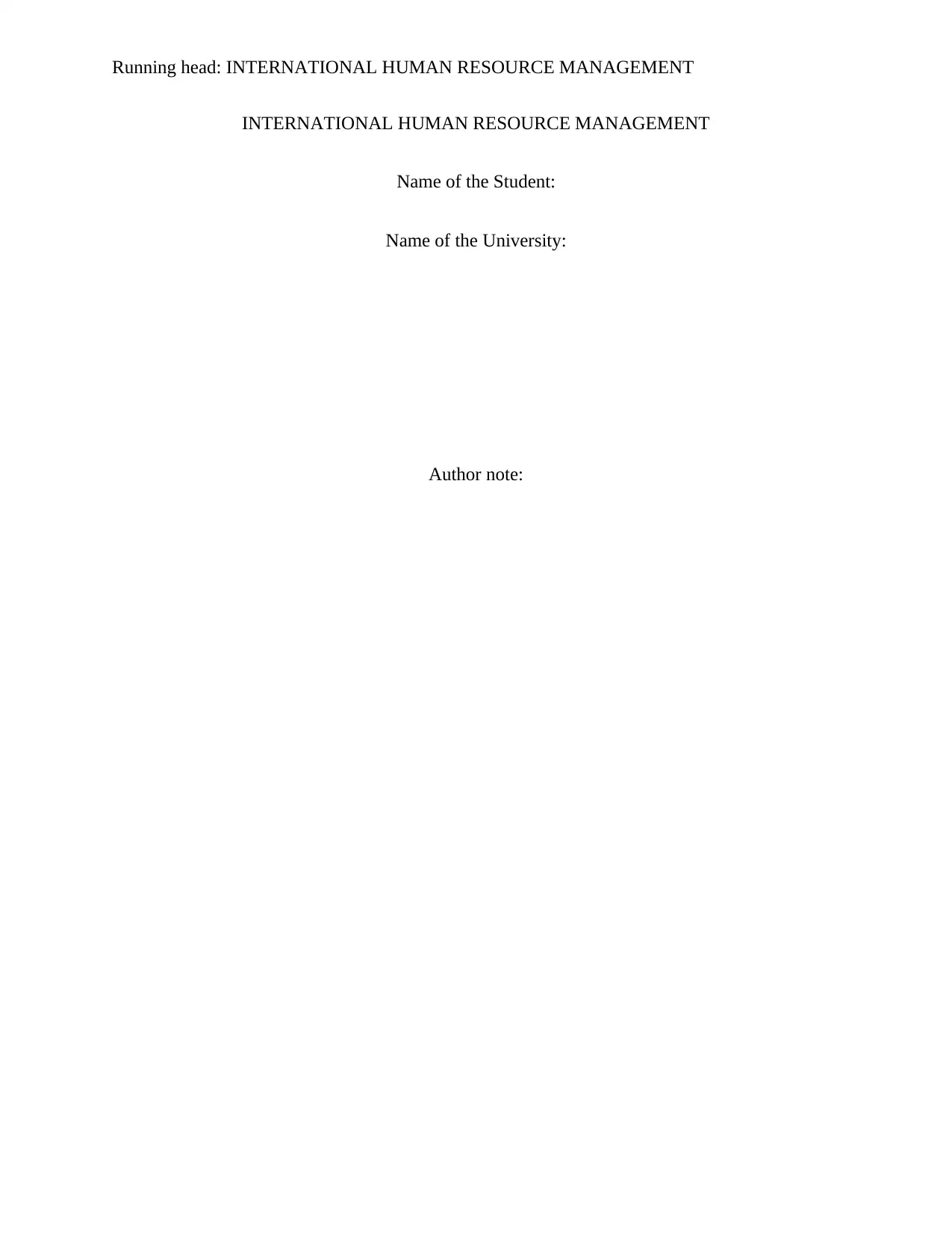
Running head: INTERNATIONAL HUMAN RESOURCE MANAGEMENT
INTERNATIONAL HUMAN RESOURCE MANAGEMENT
Name of the Student:
Name of the University:
Author note:
INTERNATIONAL HUMAN RESOURCE MANAGEMENT
Name of the Student:
Name of the University:
Author note:
Paraphrase This Document
Need a fresh take? Get an instant paraphrase of this document with our AI Paraphraser
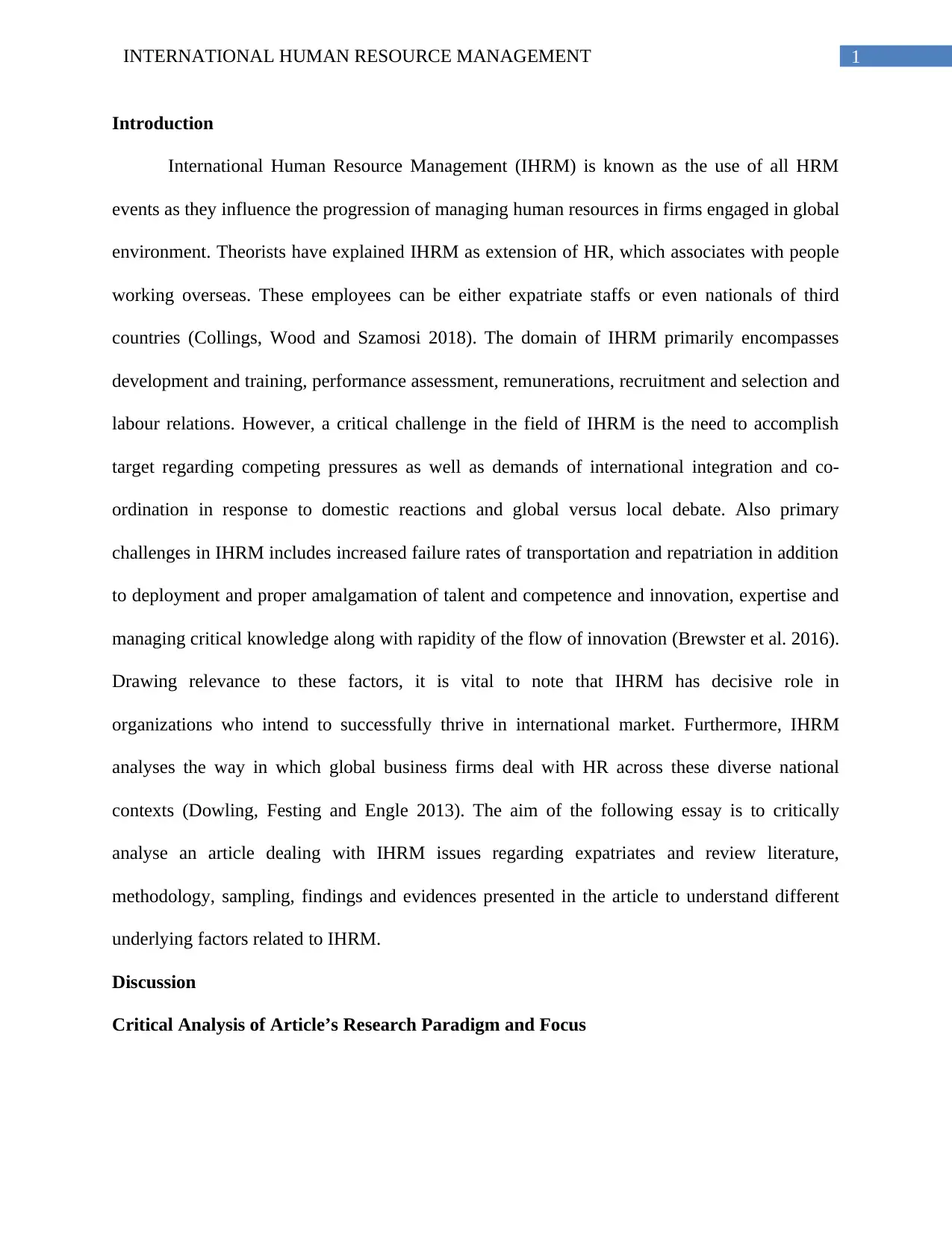
1INTERNATIONAL HUMAN RESOURCE MANAGEMENT
Introduction
International Human Resource Management (IHRM) is known as the use of all HRM
events as they influence the progression of managing human resources in firms engaged in global
environment. Theorists have explained IHRM as extension of HR, which associates with people
working overseas. These employees can be either expatriate staffs or even nationals of third
countries (Collings, Wood and Szamosi 2018). The domain of IHRM primarily encompasses
development and training, performance assessment, remunerations, recruitment and selection and
labour relations. However, a critical challenge in the field of IHRM is the need to accomplish
target regarding competing pressures as well as demands of international integration and co-
ordination in response to domestic reactions and global versus local debate. Also primary
challenges in IHRM includes increased failure rates of transportation and repatriation in addition
to deployment and proper amalgamation of talent and competence and innovation, expertise and
managing critical knowledge along with rapidity of the flow of innovation (Brewster et al. 2016).
Drawing relevance to these factors, it is vital to note that IHRM has decisive role in
organizations who intend to successfully thrive in international market. Furthermore, IHRM
analyses the way in which global business firms deal with HR across these diverse national
contexts (Dowling, Festing and Engle 2013). The aim of the following essay is to critically
analyse an article dealing with IHRM issues regarding expatriates and review literature,
methodology, sampling, findings and evidences presented in the article to understand different
underlying factors related to IHRM.
Discussion
Critical Analysis of Article’s Research Paradigm and Focus
Introduction
International Human Resource Management (IHRM) is known as the use of all HRM
events as they influence the progression of managing human resources in firms engaged in global
environment. Theorists have explained IHRM as extension of HR, which associates with people
working overseas. These employees can be either expatriate staffs or even nationals of third
countries (Collings, Wood and Szamosi 2018). The domain of IHRM primarily encompasses
development and training, performance assessment, remunerations, recruitment and selection and
labour relations. However, a critical challenge in the field of IHRM is the need to accomplish
target regarding competing pressures as well as demands of international integration and co-
ordination in response to domestic reactions and global versus local debate. Also primary
challenges in IHRM includes increased failure rates of transportation and repatriation in addition
to deployment and proper amalgamation of talent and competence and innovation, expertise and
managing critical knowledge along with rapidity of the flow of innovation (Brewster et al. 2016).
Drawing relevance to these factors, it is vital to note that IHRM has decisive role in
organizations who intend to successfully thrive in international market. Furthermore, IHRM
analyses the way in which global business firms deal with HR across these diverse national
contexts (Dowling, Festing and Engle 2013). The aim of the following essay is to critically
analyse an article dealing with IHRM issues regarding expatriates and review literature,
methodology, sampling, findings and evidences presented in the article to understand different
underlying factors related to IHRM.
Discussion
Critical Analysis of Article’s Research Paradigm and Focus
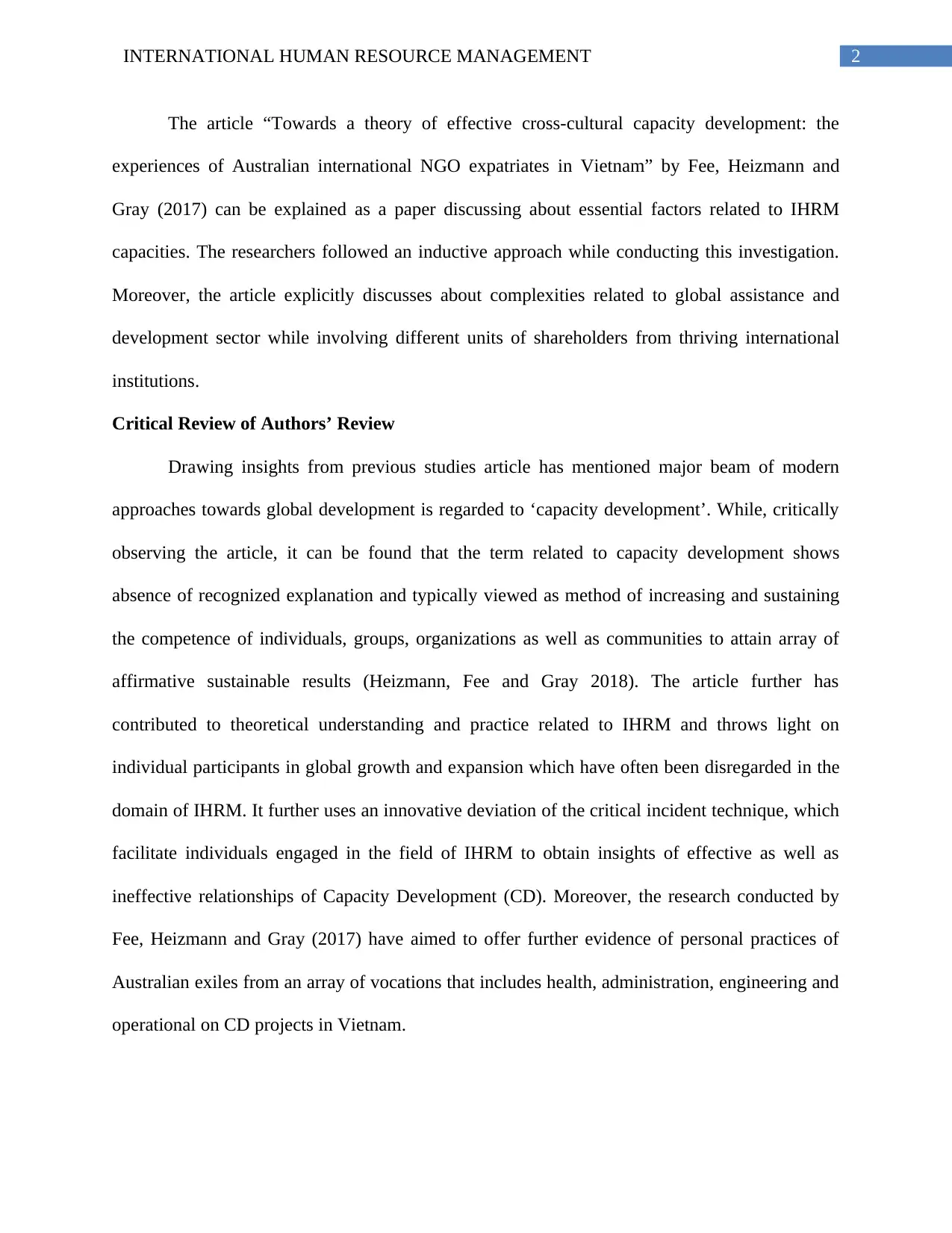
2INTERNATIONAL HUMAN RESOURCE MANAGEMENT
The article “Towards a theory of effective cross-cultural capacity development: the
experiences of Australian international NGO expatriates in Vietnam” by Fee, Heizmann and
Gray (2017) can be explained as a paper discussing about essential factors related to IHRM
capacities. The researchers followed an inductive approach while conducting this investigation.
Moreover, the article explicitly discusses about complexities related to global assistance and
development sector while involving different units of shareholders from thriving international
institutions.
Critical Review of Authors’ Review
Drawing insights from previous studies article has mentioned major beam of modern
approaches towards global development is regarded to ‘capacity development’. While, critically
observing the article, it can be found that the term related to capacity development shows
absence of recognized explanation and typically viewed as method of increasing and sustaining
the competence of individuals, groups, organizations as well as communities to attain array of
affirmative sustainable results (Heizmann, Fee and Gray 2018). The article further has
contributed to theoretical understanding and practice related to IHRM and throws light on
individual participants in global growth and expansion which have often been disregarded in the
domain of IHRM. It further uses an innovative deviation of the critical incident technique, which
facilitate individuals engaged in the field of IHRM to obtain insights of effective as well as
ineffective relationships of Capacity Development (CD). Moreover, the research conducted by
Fee, Heizmann and Gray (2017) have aimed to offer further evidence of personal practices of
Australian exiles from an array of vocations that includes health, administration, engineering and
operational on CD projects in Vietnam.
The article “Towards a theory of effective cross-cultural capacity development: the
experiences of Australian international NGO expatriates in Vietnam” by Fee, Heizmann and
Gray (2017) can be explained as a paper discussing about essential factors related to IHRM
capacities. The researchers followed an inductive approach while conducting this investigation.
Moreover, the article explicitly discusses about complexities related to global assistance and
development sector while involving different units of shareholders from thriving international
institutions.
Critical Review of Authors’ Review
Drawing insights from previous studies article has mentioned major beam of modern
approaches towards global development is regarded to ‘capacity development’. While, critically
observing the article, it can be found that the term related to capacity development shows
absence of recognized explanation and typically viewed as method of increasing and sustaining
the competence of individuals, groups, organizations as well as communities to attain array of
affirmative sustainable results (Heizmann, Fee and Gray 2018). The article further has
contributed to theoretical understanding and practice related to IHRM and throws light on
individual participants in global growth and expansion which have often been disregarded in the
domain of IHRM. It further uses an innovative deviation of the critical incident technique, which
facilitate individuals engaged in the field of IHRM to obtain insights of effective as well as
ineffective relationships of Capacity Development (CD). Moreover, the research conducted by
Fee, Heizmann and Gray (2017) have aimed to offer further evidence of personal practices of
Australian exiles from an array of vocations that includes health, administration, engineering and
operational on CD projects in Vietnam.
⊘ This is a preview!⊘
Do you want full access?
Subscribe today to unlock all pages.

Trusted by 1+ million students worldwide
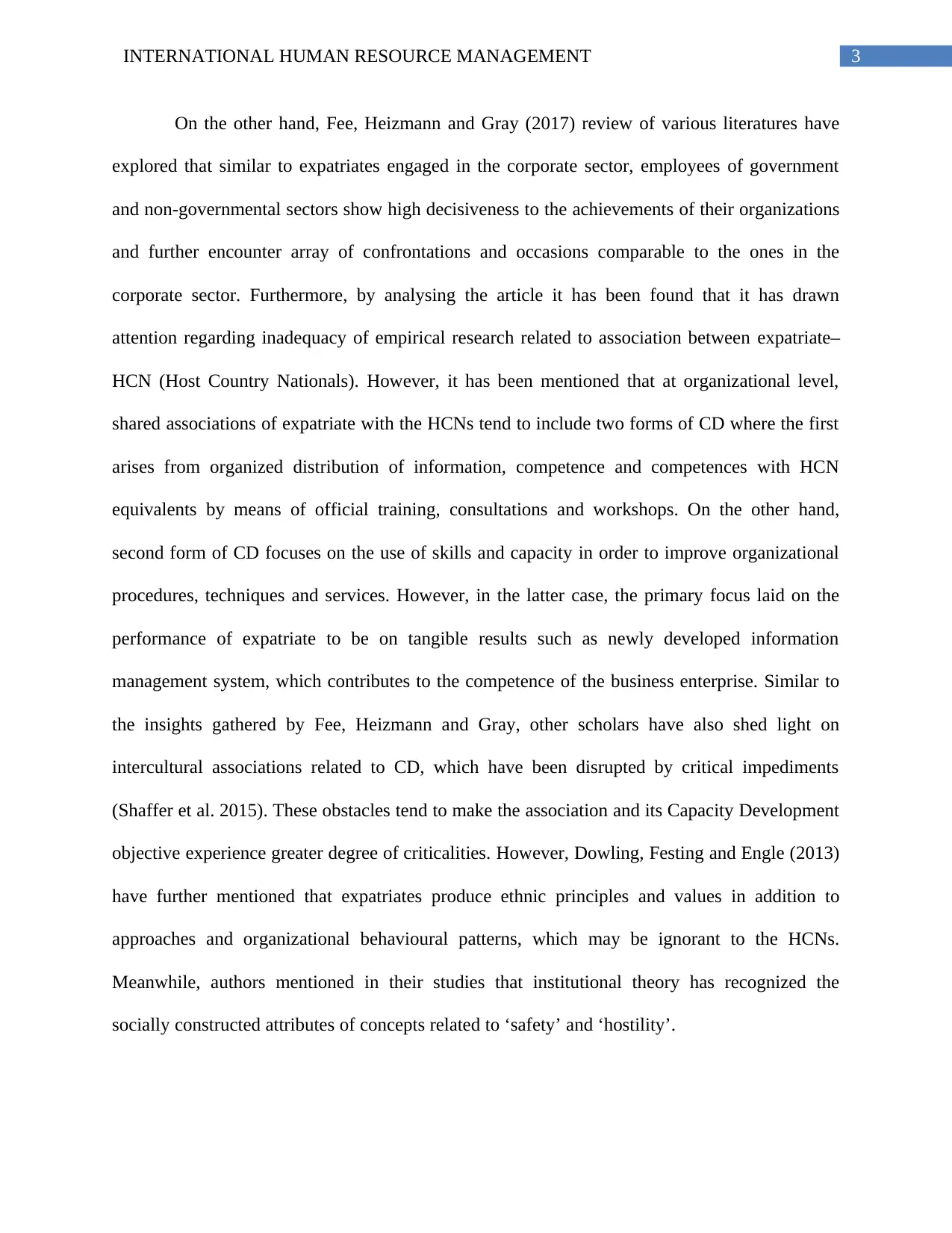
3INTERNATIONAL HUMAN RESOURCE MANAGEMENT
On the other hand, Fee, Heizmann and Gray (2017) review of various literatures have
explored that similar to expatriates engaged in the corporate sector, employees of government
and non-governmental sectors show high decisiveness to the achievements of their organizations
and further encounter array of confrontations and occasions comparable to the ones in the
corporate sector. Furthermore, by analysing the article it has been found that it has drawn
attention regarding inadequacy of empirical research related to association between expatriate–
HCN (Host Country Nationals). However, it has been mentioned that at organizational level,
shared associations of expatriate with the HCNs tend to include two forms of CD where the first
arises from organized distribution of information, competence and competences with HCN
equivalents by means of official training, consultations and workshops. On the other hand,
second form of CD focuses on the use of skills and capacity in order to improve organizational
procedures, techniques and services. However, in the latter case, the primary focus laid on the
performance of expatriate to be on tangible results such as newly developed information
management system, which contributes to the competence of the business enterprise. Similar to
the insights gathered by Fee, Heizmann and Gray, other scholars have also shed light on
intercultural associations related to CD, which have been disrupted by critical impediments
(Shaffer et al. 2015). These obstacles tend to make the association and its Capacity Development
objective experience greater degree of criticalities. However, Dowling, Festing and Engle (2013)
have further mentioned that expatriates produce ethnic principles and values in addition to
approaches and organizational behavioural patterns, which may be ignorant to the HCNs.
Meanwhile, authors mentioned in their studies that institutional theory has recognized the
socially constructed attributes of concepts related to ‘safety’ and ‘hostility’.
On the other hand, Fee, Heizmann and Gray (2017) review of various literatures have
explored that similar to expatriates engaged in the corporate sector, employees of government
and non-governmental sectors show high decisiveness to the achievements of their organizations
and further encounter array of confrontations and occasions comparable to the ones in the
corporate sector. Furthermore, by analysing the article it has been found that it has drawn
attention regarding inadequacy of empirical research related to association between expatriate–
HCN (Host Country Nationals). However, it has been mentioned that at organizational level,
shared associations of expatriate with the HCNs tend to include two forms of CD where the first
arises from organized distribution of information, competence and competences with HCN
equivalents by means of official training, consultations and workshops. On the other hand,
second form of CD focuses on the use of skills and capacity in order to improve organizational
procedures, techniques and services. However, in the latter case, the primary focus laid on the
performance of expatriate to be on tangible results such as newly developed information
management system, which contributes to the competence of the business enterprise. Similar to
the insights gathered by Fee, Heizmann and Gray, other scholars have also shed light on
intercultural associations related to CD, which have been disrupted by critical impediments
(Shaffer et al. 2015). These obstacles tend to make the association and its Capacity Development
objective experience greater degree of criticalities. However, Dowling, Festing and Engle (2013)
have further mentioned that expatriates produce ethnic principles and values in addition to
approaches and organizational behavioural patterns, which may be ignorant to the HCNs.
Meanwhile, authors mentioned in their studies that institutional theory has recognized the
socially constructed attributes of concepts related to ‘safety’ and ‘hostility’.
Paraphrase This Document
Need a fresh take? Get an instant paraphrase of this document with our AI Paraphraser
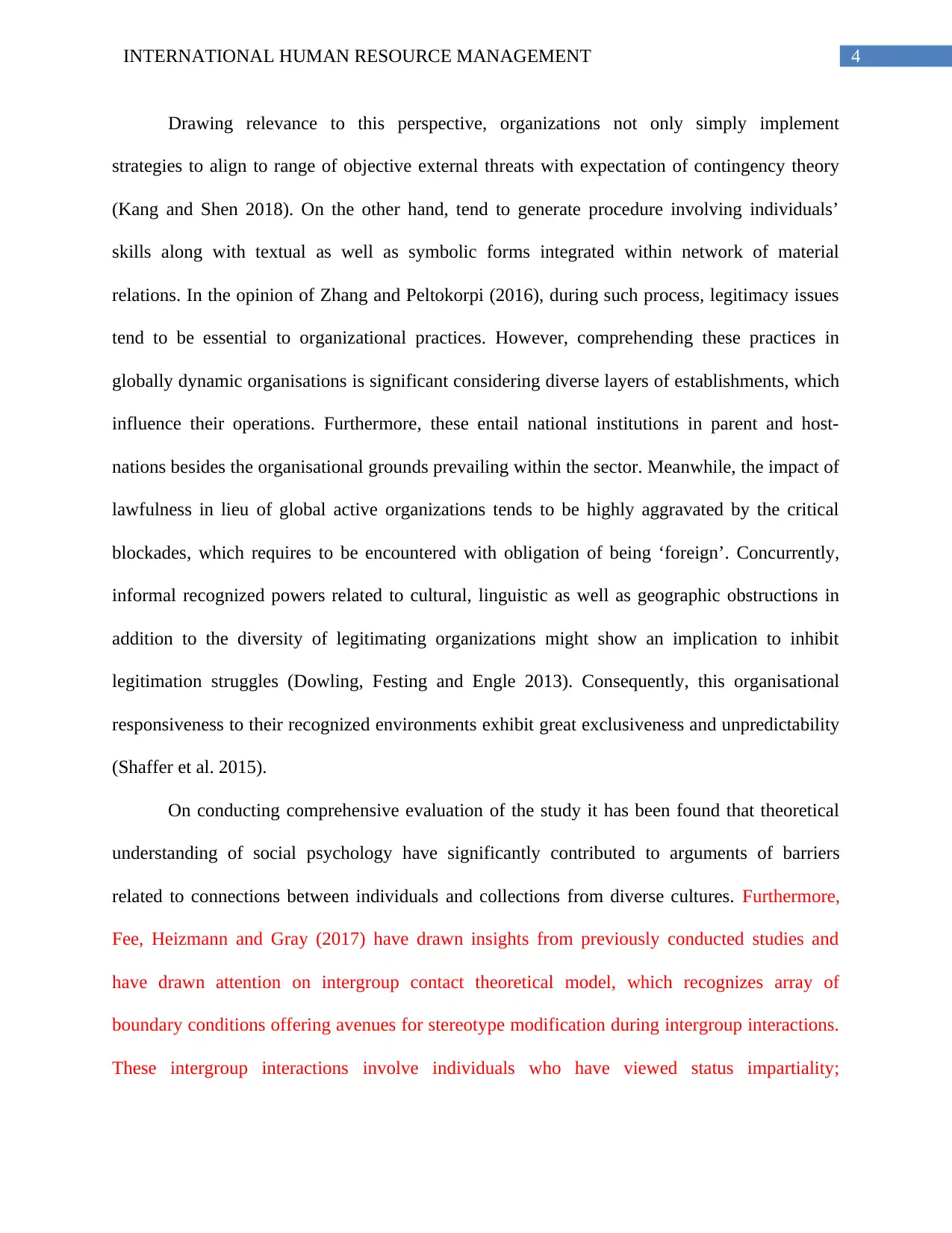
4INTERNATIONAL HUMAN RESOURCE MANAGEMENT
Drawing relevance to this perspective, organizations not only simply implement
strategies to align to range of objective external threats with expectation of contingency theory
(Kang and Shen 2018). On the other hand, tend to generate procedure involving individuals’
skills along with textual as well as symbolic forms integrated within network of material
relations. In the opinion of Zhang and Peltokorpi (2016), during such process, legitimacy issues
tend to be essential to organizational practices. However, comprehending these practices in
globally dynamic organisations is significant considering diverse layers of establishments, which
influence their operations. Furthermore, these entail national institutions in parent and host-
nations besides the organisational grounds prevailing within the sector. Meanwhile, the impact of
lawfulness in lieu of global active organizations tends to be highly aggravated by the critical
blockades, which requires to be encountered with obligation of being ‘foreign’. Concurrently,
informal recognized powers related to cultural, linguistic as well as geographic obstructions in
addition to the diversity of legitimating organizations might show an implication to inhibit
legitimation struggles (Dowling, Festing and Engle 2013). Consequently, this organisational
responsiveness to their recognized environments exhibit great exclusiveness and unpredictability
(Shaffer et al. 2015).
On conducting comprehensive evaluation of the study it has been found that theoretical
understanding of social psychology have significantly contributed to arguments of barriers
related to connections between individuals and collections from diverse cultures. Furthermore,
Fee, Heizmann and Gray (2017) have drawn insights from previously conducted studies and
have drawn attention on intergroup contact theoretical model, which recognizes array of
boundary conditions offering avenues for stereotype modification during intergroup interactions.
These intergroup interactions involve individuals who have viewed status impartiality;
Drawing relevance to this perspective, organizations not only simply implement
strategies to align to range of objective external threats with expectation of contingency theory
(Kang and Shen 2018). On the other hand, tend to generate procedure involving individuals’
skills along with textual as well as symbolic forms integrated within network of material
relations. In the opinion of Zhang and Peltokorpi (2016), during such process, legitimacy issues
tend to be essential to organizational practices. However, comprehending these practices in
globally dynamic organisations is significant considering diverse layers of establishments, which
influence their operations. Furthermore, these entail national institutions in parent and host-
nations besides the organisational grounds prevailing within the sector. Meanwhile, the impact of
lawfulness in lieu of global active organizations tends to be highly aggravated by the critical
blockades, which requires to be encountered with obligation of being ‘foreign’. Concurrently,
informal recognized powers related to cultural, linguistic as well as geographic obstructions in
addition to the diversity of legitimating organizations might show an implication to inhibit
legitimation struggles (Dowling, Festing and Engle 2013). Consequently, this organisational
responsiveness to their recognized environments exhibit great exclusiveness and unpredictability
(Shaffer et al. 2015).
On conducting comprehensive evaluation of the study it has been found that theoretical
understanding of social psychology have significantly contributed to arguments of barriers
related to connections between individuals and collections from diverse cultures. Furthermore,
Fee, Heizmann and Gray (2017) have drawn insights from previously conducted studies and
have drawn attention on intergroup contact theoretical model, which recognizes array of
boundary conditions offering avenues for stereotype modification during intergroup interactions.
These intergroup interactions involve individuals who have viewed status impartiality;
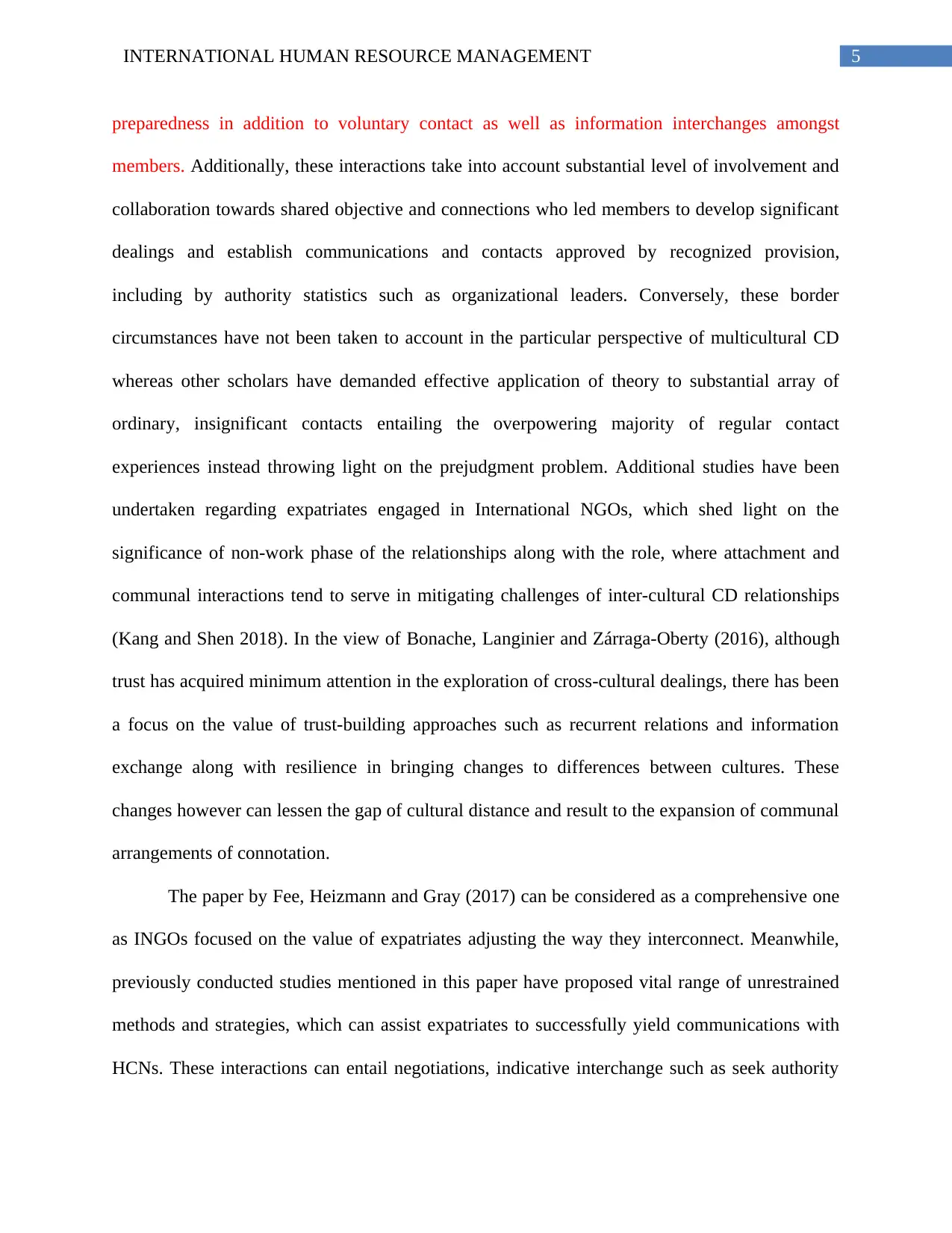
5INTERNATIONAL HUMAN RESOURCE MANAGEMENT
preparedness in addition to voluntary contact as well as information interchanges amongst
members. Additionally, these interactions take into account substantial level of involvement and
collaboration towards shared objective and connections who led members to develop significant
dealings and establish communications and contacts approved by recognized provision,
including by authority statistics such as organizational leaders. Conversely, these border
circumstances have not been taken to account in the particular perspective of multicultural CD
whereas other scholars have demanded effective application of theory to substantial array of
ordinary, insignificant contacts entailing the overpowering majority of regular contact
experiences instead throwing light on the prejudgment problem. Additional studies have been
undertaken regarding expatriates engaged in International NGOs, which shed light on the
significance of non-work phase of the relationships along with the role, where attachment and
communal interactions tend to serve in mitigating challenges of inter-cultural CD relationships
(Kang and Shen 2018). In the view of Bonache, Langinier and Zárraga-Oberty (2016), although
trust has acquired minimum attention in the exploration of cross-cultural dealings, there has been
a focus on the value of trust-building approaches such as recurrent relations and information
exchange along with resilience in bringing changes to differences between cultures. These
changes however can lessen the gap of cultural distance and result to the expansion of communal
arrangements of connotation.
The paper by Fee, Heizmann and Gray (2017) can be considered as a comprehensive one
as INGOs focused on the value of expatriates adjusting the way they interconnect. Meanwhile,
previously conducted studies mentioned in this paper have proposed vital range of unrestrained
methods and strategies, which can assist expatriates to successfully yield communications with
HCNs. These interactions can entail negotiations, indicative interchange such as seek authority
preparedness in addition to voluntary contact as well as information interchanges amongst
members. Additionally, these interactions take into account substantial level of involvement and
collaboration towards shared objective and connections who led members to develop significant
dealings and establish communications and contacts approved by recognized provision,
including by authority statistics such as organizational leaders. Conversely, these border
circumstances have not been taken to account in the particular perspective of multicultural CD
whereas other scholars have demanded effective application of theory to substantial array of
ordinary, insignificant contacts entailing the overpowering majority of regular contact
experiences instead throwing light on the prejudgment problem. Additional studies have been
undertaken regarding expatriates engaged in International NGOs, which shed light on the
significance of non-work phase of the relationships along with the role, where attachment and
communal interactions tend to serve in mitigating challenges of inter-cultural CD relationships
(Kang and Shen 2018). In the view of Bonache, Langinier and Zárraga-Oberty (2016), although
trust has acquired minimum attention in the exploration of cross-cultural dealings, there has been
a focus on the value of trust-building approaches such as recurrent relations and information
exchange along with resilience in bringing changes to differences between cultures. These
changes however can lessen the gap of cultural distance and result to the expansion of communal
arrangements of connotation.
The paper by Fee, Heizmann and Gray (2017) can be considered as a comprehensive one
as INGOs focused on the value of expatriates adjusting the way they interconnect. Meanwhile,
previously conducted studies mentioned in this paper have proposed vital range of unrestrained
methods and strategies, which can assist expatriates to successfully yield communications with
HCNs. These interactions can entail negotiations, indicative interchange such as seek authority
⊘ This is a preview!⊘
Do you want full access?
Subscribe today to unlock all pages.

Trusted by 1+ million students worldwide
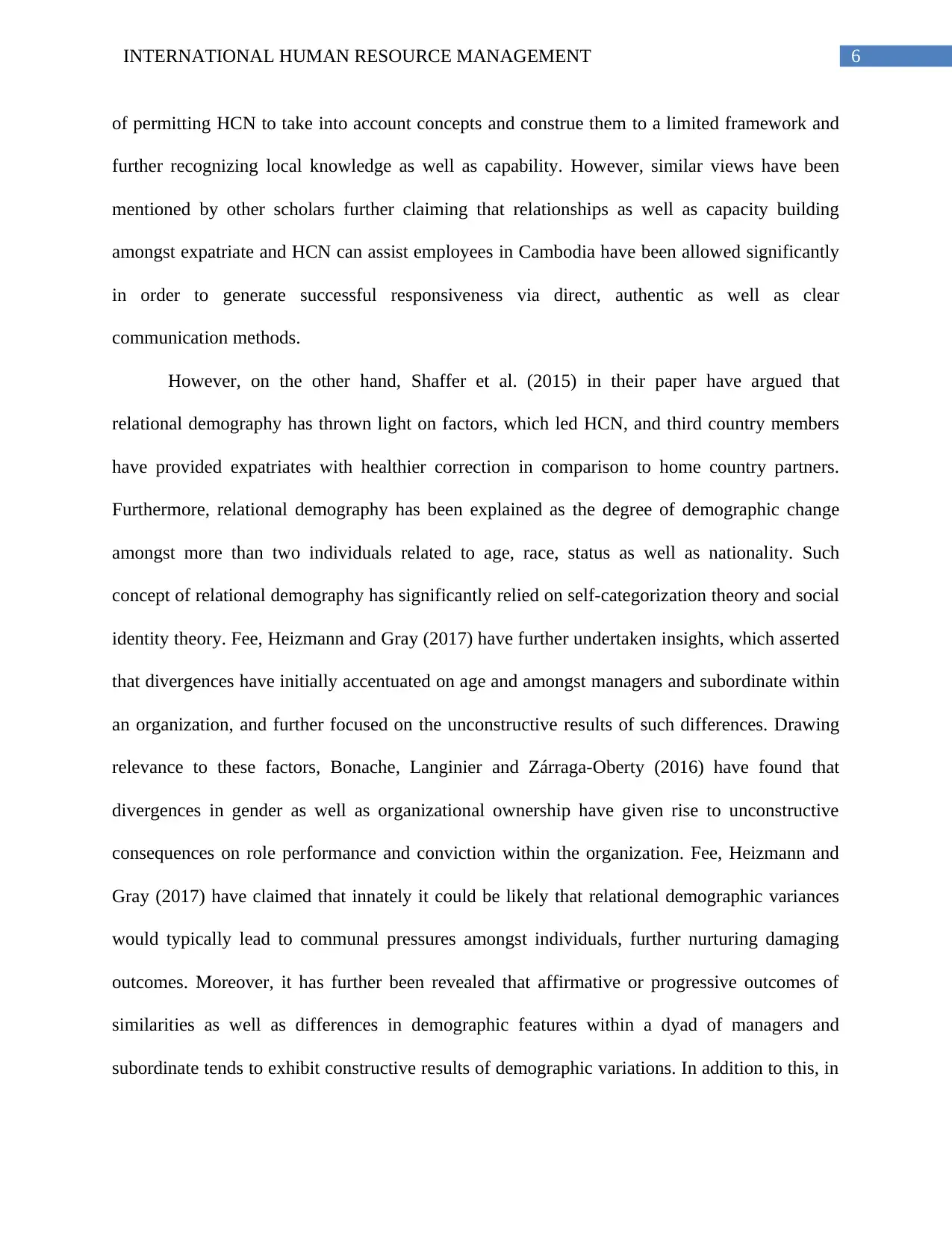
6INTERNATIONAL HUMAN RESOURCE MANAGEMENT
of permitting HCN to take into account concepts and construe them to a limited framework and
further recognizing local knowledge as well as capability. However, similar views have been
mentioned by other scholars further claiming that relationships as well as capacity building
amongst expatriate and HCN can assist employees in Cambodia have been allowed significantly
in order to generate successful responsiveness via direct, authentic as well as clear
communication methods.
However, on the other hand, Shaffer et al. (2015) in their paper have argued that
relational demography has thrown light on factors, which led HCN, and third country members
have provided expatriates with healthier correction in comparison to home country partners.
Furthermore, relational demography has been explained as the degree of demographic change
amongst more than two individuals related to age, race, status as well as nationality. Such
concept of relational demography has significantly relied on self-categorization theory and social
identity theory. Fee, Heizmann and Gray (2017) have further undertaken insights, which asserted
that divergences have initially accentuated on age and amongst managers and subordinate within
an organization, and further focused on the unconstructive results of such differences. Drawing
relevance to these factors, Bonache, Langinier and Zárraga-Oberty (2016) have found that
divergences in gender as well as organizational ownership have given rise to unconstructive
consequences on role performance and conviction within the organization. Fee, Heizmann and
Gray (2017) have claimed that innately it could be likely that relational demographic variances
would typically lead to communal pressures amongst individuals, further nurturing damaging
outcomes. Moreover, it has further been revealed that affirmative or progressive outcomes of
similarities as well as differences in demographic features within a dyad of managers and
subordinate tends to exhibit constructive results of demographic variations. In addition to this, in
of permitting HCN to take into account concepts and construe them to a limited framework and
further recognizing local knowledge as well as capability. However, similar views have been
mentioned by other scholars further claiming that relationships as well as capacity building
amongst expatriate and HCN can assist employees in Cambodia have been allowed significantly
in order to generate successful responsiveness via direct, authentic as well as clear
communication methods.
However, on the other hand, Shaffer et al. (2015) in their paper have argued that
relational demography has thrown light on factors, which led HCN, and third country members
have provided expatriates with healthier correction in comparison to home country partners.
Furthermore, relational demography has been explained as the degree of demographic change
amongst more than two individuals related to age, race, status as well as nationality. Such
concept of relational demography has significantly relied on self-categorization theory and social
identity theory. Fee, Heizmann and Gray (2017) have further undertaken insights, which asserted
that divergences have initially accentuated on age and amongst managers and subordinate within
an organization, and further focused on the unconstructive results of such differences. Drawing
relevance to these factors, Bonache, Langinier and Zárraga-Oberty (2016) have found that
divergences in gender as well as organizational ownership have given rise to unconstructive
consequences on role performance and conviction within the organization. Fee, Heizmann and
Gray (2017) have claimed that innately it could be likely that relational demographic variances
would typically lead to communal pressures amongst individuals, further nurturing damaging
outcomes. Moreover, it has further been revealed that affirmative or progressive outcomes of
similarities as well as differences in demographic features within a dyad of managers and
subordinate tends to exhibit constructive results of demographic variations. In addition to this, in
Paraphrase This Document
Need a fresh take? Get an instant paraphrase of this document with our AI Paraphraser
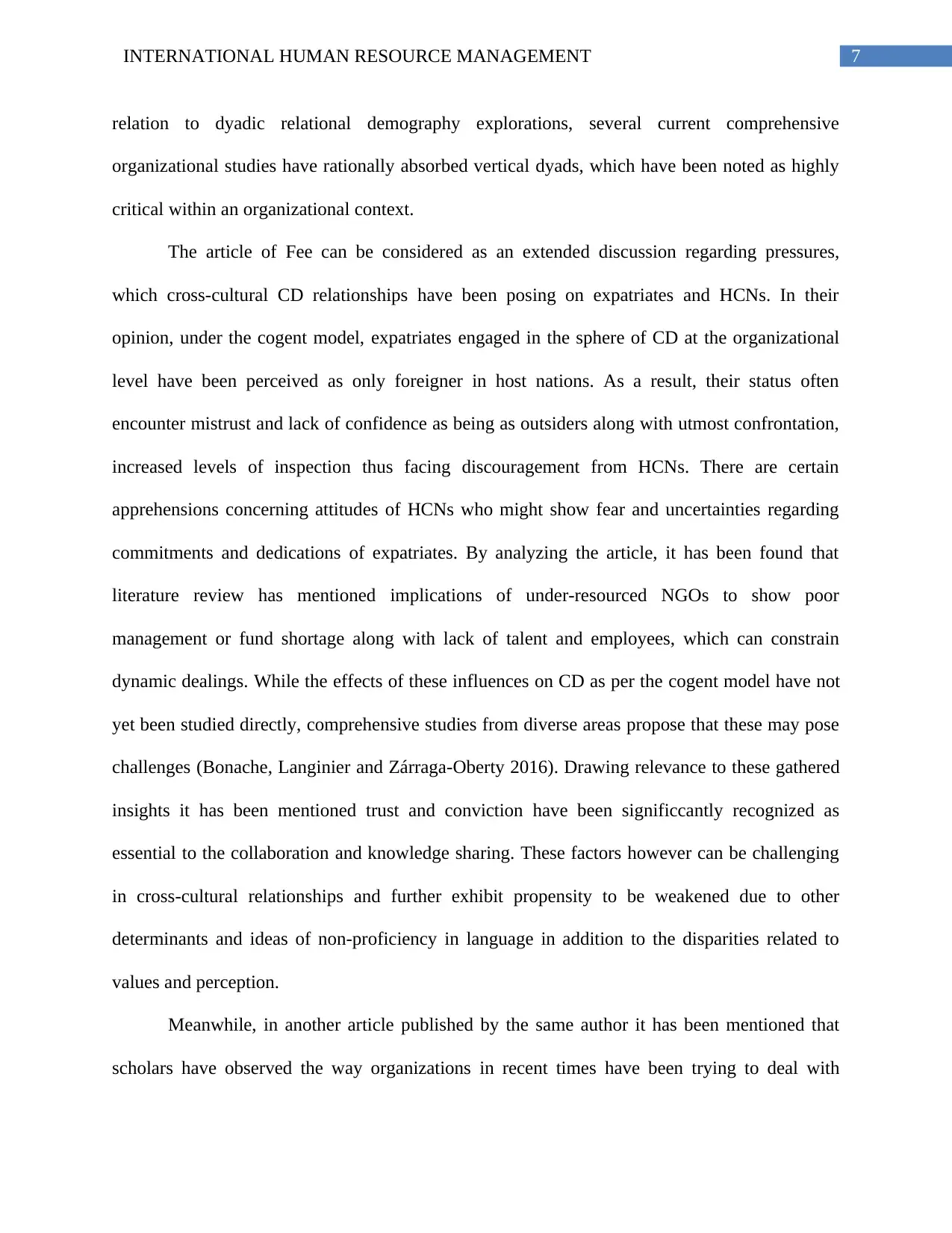
7INTERNATIONAL HUMAN RESOURCE MANAGEMENT
relation to dyadic relational demography explorations, several current comprehensive
organizational studies have rationally absorbed vertical dyads, which have been noted as highly
critical within an organizational context.
The article of Fee can be considered as an extended discussion regarding pressures,
which cross-cultural CD relationships have been posing on expatriates and HCNs. In their
opinion, under the cogent model, expatriates engaged in the sphere of CD at the organizational
level have been perceived as only foreigner in host nations. As a result, their status often
encounter mistrust and lack of confidence as being as outsiders along with utmost confrontation,
increased levels of inspection thus facing discouragement from HCNs. There are certain
apprehensions concerning attitudes of HCNs who might show fear and uncertainties regarding
commitments and dedications of expatriates. By analyzing the article, it has been found that
literature review has mentioned implications of under-resourced NGOs to show poor
management or fund shortage along with lack of talent and employees, which can constrain
dynamic dealings. While the effects of these influences on CD as per the cogent model have not
yet been studied directly, comprehensive studies from diverse areas propose that these may pose
challenges (Bonache, Langinier and Zárraga-Oberty 2016). Drawing relevance to these gathered
insights it has been mentioned trust and conviction have been significcantly recognized as
essential to the collaboration and knowledge sharing. These factors however can be challenging
in cross-cultural relationships and further exhibit propensity to be weakened due to other
determinants and ideas of non-proficiency in language in addition to the disparities related to
values and perception.
Meanwhile, in another article published by the same author it has been mentioned that
scholars have observed the way organizations in recent times have been trying to deal with
relation to dyadic relational demography explorations, several current comprehensive
organizational studies have rationally absorbed vertical dyads, which have been noted as highly
critical within an organizational context.
The article of Fee can be considered as an extended discussion regarding pressures,
which cross-cultural CD relationships have been posing on expatriates and HCNs. In their
opinion, under the cogent model, expatriates engaged in the sphere of CD at the organizational
level have been perceived as only foreigner in host nations. As a result, their status often
encounter mistrust and lack of confidence as being as outsiders along with utmost confrontation,
increased levels of inspection thus facing discouragement from HCNs. There are certain
apprehensions concerning attitudes of HCNs who might show fear and uncertainties regarding
commitments and dedications of expatriates. By analyzing the article, it has been found that
literature review has mentioned implications of under-resourced NGOs to show poor
management or fund shortage along with lack of talent and employees, which can constrain
dynamic dealings. While the effects of these influences on CD as per the cogent model have not
yet been studied directly, comprehensive studies from diverse areas propose that these may pose
challenges (Bonache, Langinier and Zárraga-Oberty 2016). Drawing relevance to these gathered
insights it has been mentioned trust and conviction have been significcantly recognized as
essential to the collaboration and knowledge sharing. These factors however can be challenging
in cross-cultural relationships and further exhibit propensity to be weakened due to other
determinants and ideas of non-proficiency in language in addition to the disparities related to
values and perception.
Meanwhile, in another article published by the same author it has been mentioned that
scholars have observed the way organizations in recent times have been trying to deal with
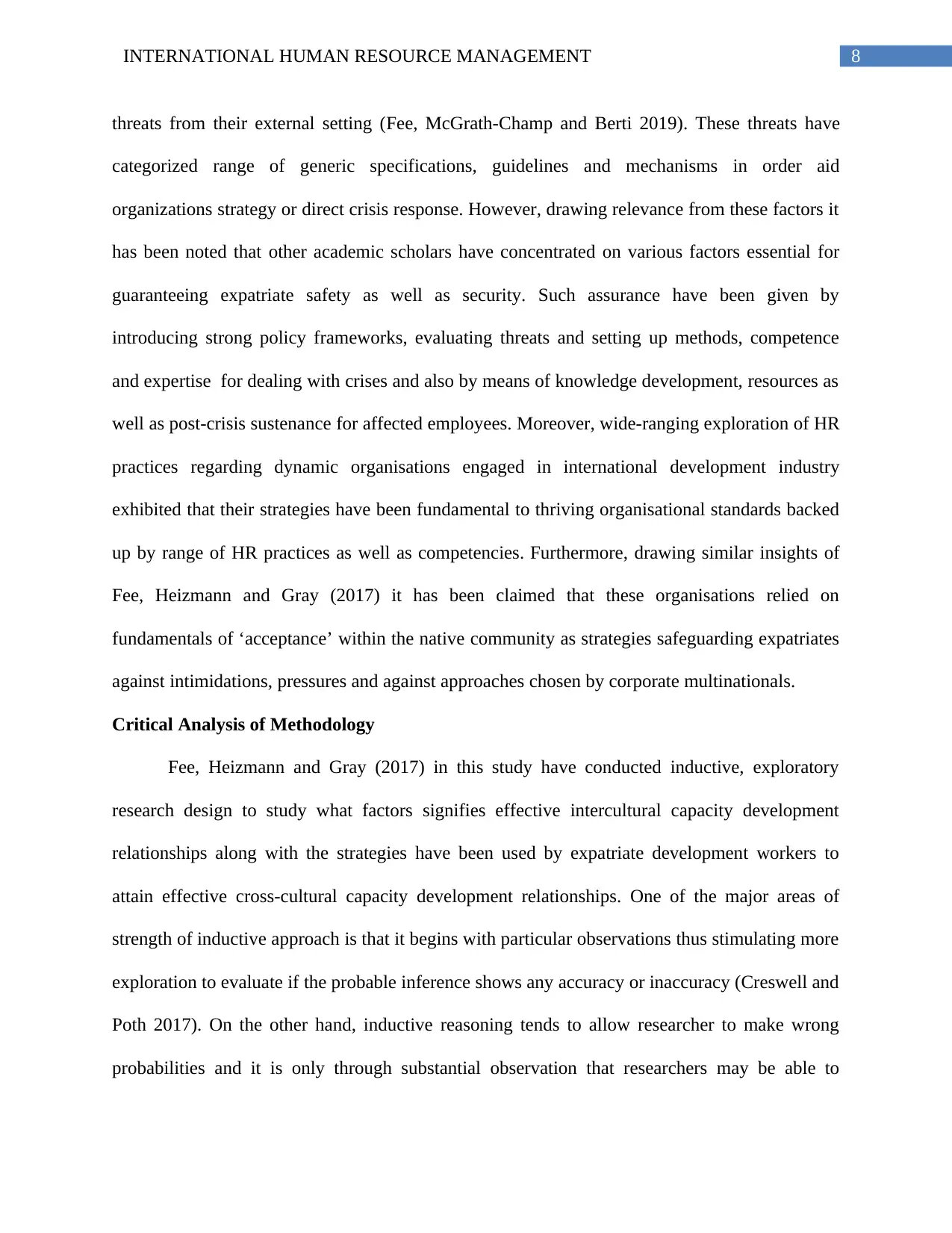
8INTERNATIONAL HUMAN RESOURCE MANAGEMENT
threats from their external setting (Fee, McGrath-Champ and Berti 2019). These threats have
categorized range of generic specifications, guidelines and mechanisms in order aid
organizations strategy or direct crisis response. However, drawing relevance from these factors it
has been noted that other academic scholars have concentrated on various factors essential for
guaranteeing expatriate safety as well as security. Such assurance have been given by
introducing strong policy frameworks, evaluating threats and setting up methods, competence
and expertise for dealing with crises and also by means of knowledge development, resources as
well as post-crisis sustenance for affected employees. Moreover, wide-ranging exploration of HR
practices regarding dynamic organisations engaged in international development industry
exhibited that their strategies have been fundamental to thriving organisational standards backed
up by range of HR practices as well as competencies. Furthermore, drawing similar insights of
Fee, Heizmann and Gray (2017) it has been claimed that these organisations relied on
fundamentals of ‘acceptance’ within the native community as strategies safeguarding expatriates
against intimidations, pressures and against approaches chosen by corporate multinationals.
Critical Analysis of Methodology
Fee, Heizmann and Gray (2017) in this study have conducted inductive, exploratory
research design to study what factors signifies effective intercultural capacity development
relationships along with the strategies have been used by expatriate development workers to
attain effective cross-cultural capacity development relationships. One of the major areas of
strength of inductive approach is that it begins with particular observations thus stimulating more
exploration to evaluate if the probable inference shows any accuracy or inaccuracy (Creswell and
Poth 2017). On the other hand, inductive reasoning tends to allow researcher to make wrong
probabilities and it is only through substantial observation that researchers may be able to
threats from their external setting (Fee, McGrath-Champ and Berti 2019). These threats have
categorized range of generic specifications, guidelines and mechanisms in order aid
organizations strategy or direct crisis response. However, drawing relevance from these factors it
has been noted that other academic scholars have concentrated on various factors essential for
guaranteeing expatriate safety as well as security. Such assurance have been given by
introducing strong policy frameworks, evaluating threats and setting up methods, competence
and expertise for dealing with crises and also by means of knowledge development, resources as
well as post-crisis sustenance for affected employees. Moreover, wide-ranging exploration of HR
practices regarding dynamic organisations engaged in international development industry
exhibited that their strategies have been fundamental to thriving organisational standards backed
up by range of HR practices as well as competencies. Furthermore, drawing similar insights of
Fee, Heizmann and Gray (2017) it has been claimed that these organisations relied on
fundamentals of ‘acceptance’ within the native community as strategies safeguarding expatriates
against intimidations, pressures and against approaches chosen by corporate multinationals.
Critical Analysis of Methodology
Fee, Heizmann and Gray (2017) in this study have conducted inductive, exploratory
research design to study what factors signifies effective intercultural capacity development
relationships along with the strategies have been used by expatriate development workers to
attain effective cross-cultural capacity development relationships. One of the major areas of
strength of inductive approach is that it begins with particular observations thus stimulating more
exploration to evaluate if the probable inference shows any accuracy or inaccuracy (Creswell and
Poth 2017). On the other hand, inductive reasoning tends to allow researcher to make wrong
probabilities and it is only through substantial observation that researchers may be able to
⊘ This is a preview!⊘
Do you want full access?
Subscribe today to unlock all pages.

Trusted by 1+ million students worldwide
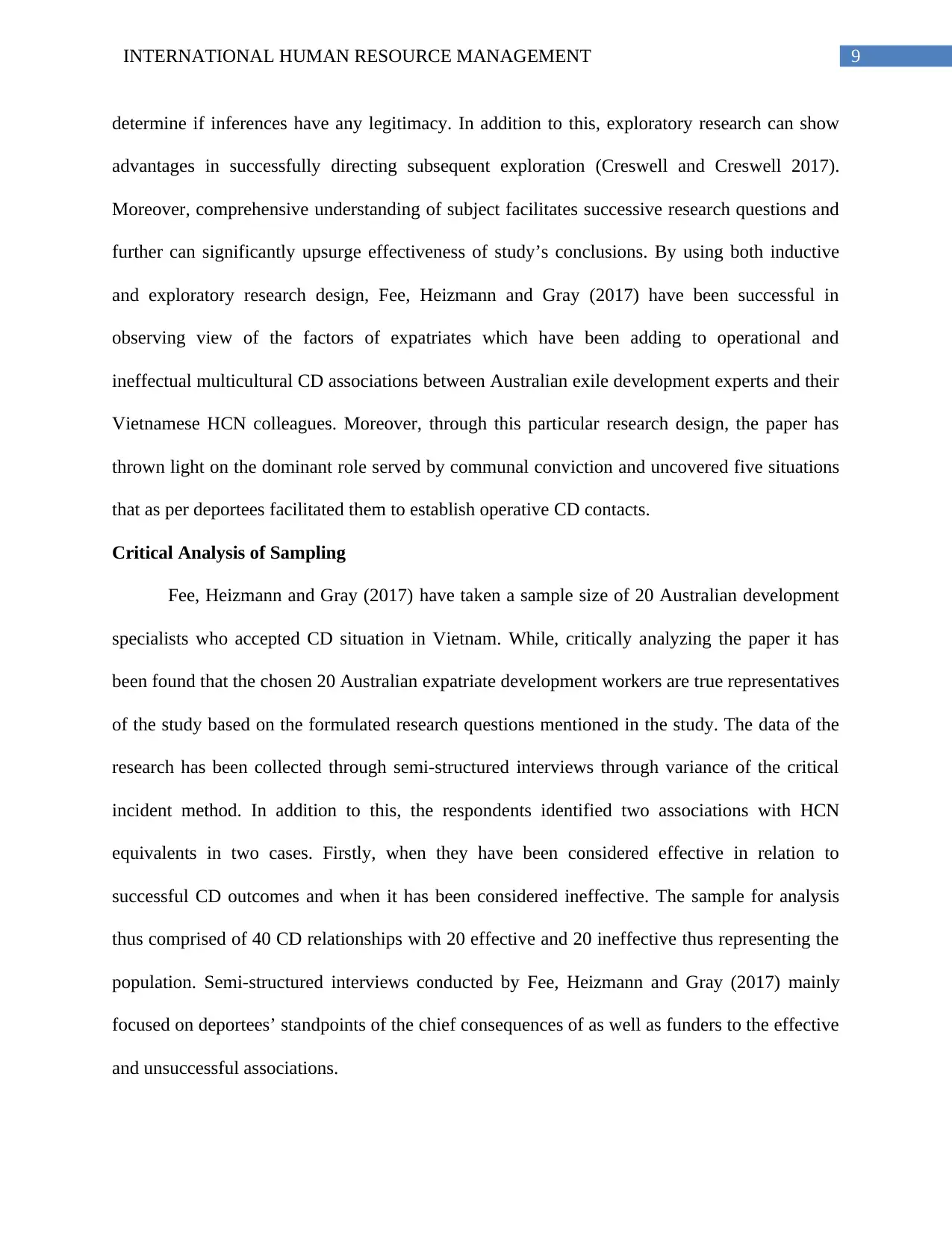
9INTERNATIONAL HUMAN RESOURCE MANAGEMENT
determine if inferences have any legitimacy. In addition to this, exploratory research can show
advantages in successfully directing subsequent exploration (Creswell and Creswell 2017).
Moreover, comprehensive understanding of subject facilitates successive research questions and
further can significantly upsurge effectiveness of study’s conclusions. By using both inductive
and exploratory research design, Fee, Heizmann and Gray (2017) have been successful in
observing view of the factors of expatriates which have been adding to operational and
ineffectual multicultural CD associations between Australian exile development experts and their
Vietnamese HCN colleagues. Moreover, through this particular research design, the paper has
thrown light on the dominant role served by communal conviction and uncovered five situations
that as per deportees facilitated them to establish operative CD contacts.
Critical Analysis of Sampling
Fee, Heizmann and Gray (2017) have taken a sample size of 20 Australian development
specialists who accepted CD situation in Vietnam. While, critically analyzing the paper it has
been found that the chosen 20 Australian expatriate development workers are true representatives
of the study based on the formulated research questions mentioned in the study. The data of the
research has been collected through semi-structured interviews through variance of the critical
incident method. In addition to this, the respondents identified two associations with HCN
equivalents in two cases. Firstly, when they have been considered effective in relation to
successful CD outcomes and when it has been considered ineffective. The sample for analysis
thus comprised of 40 CD relationships with 20 effective and 20 ineffective thus representing the
population. Semi-structured interviews conducted by Fee, Heizmann and Gray (2017) mainly
focused on deportees’ standpoints of the chief consequences of as well as funders to the effective
and unsuccessful associations.
determine if inferences have any legitimacy. In addition to this, exploratory research can show
advantages in successfully directing subsequent exploration (Creswell and Creswell 2017).
Moreover, comprehensive understanding of subject facilitates successive research questions and
further can significantly upsurge effectiveness of study’s conclusions. By using both inductive
and exploratory research design, Fee, Heizmann and Gray (2017) have been successful in
observing view of the factors of expatriates which have been adding to operational and
ineffectual multicultural CD associations between Australian exile development experts and their
Vietnamese HCN colleagues. Moreover, through this particular research design, the paper has
thrown light on the dominant role served by communal conviction and uncovered five situations
that as per deportees facilitated them to establish operative CD contacts.
Critical Analysis of Sampling
Fee, Heizmann and Gray (2017) have taken a sample size of 20 Australian development
specialists who accepted CD situation in Vietnam. While, critically analyzing the paper it has
been found that the chosen 20 Australian expatriate development workers are true representatives
of the study based on the formulated research questions mentioned in the study. The data of the
research has been collected through semi-structured interviews through variance of the critical
incident method. In addition to this, the respondents identified two associations with HCN
equivalents in two cases. Firstly, when they have been considered effective in relation to
successful CD outcomes and when it has been considered ineffective. The sample for analysis
thus comprised of 40 CD relationships with 20 effective and 20 ineffective thus representing the
population. Semi-structured interviews conducted by Fee, Heizmann and Gray (2017) mainly
focused on deportees’ standpoints of the chief consequences of as well as funders to the effective
and unsuccessful associations.
Paraphrase This Document
Need a fresh take? Get an instant paraphrase of this document with our AI Paraphraser
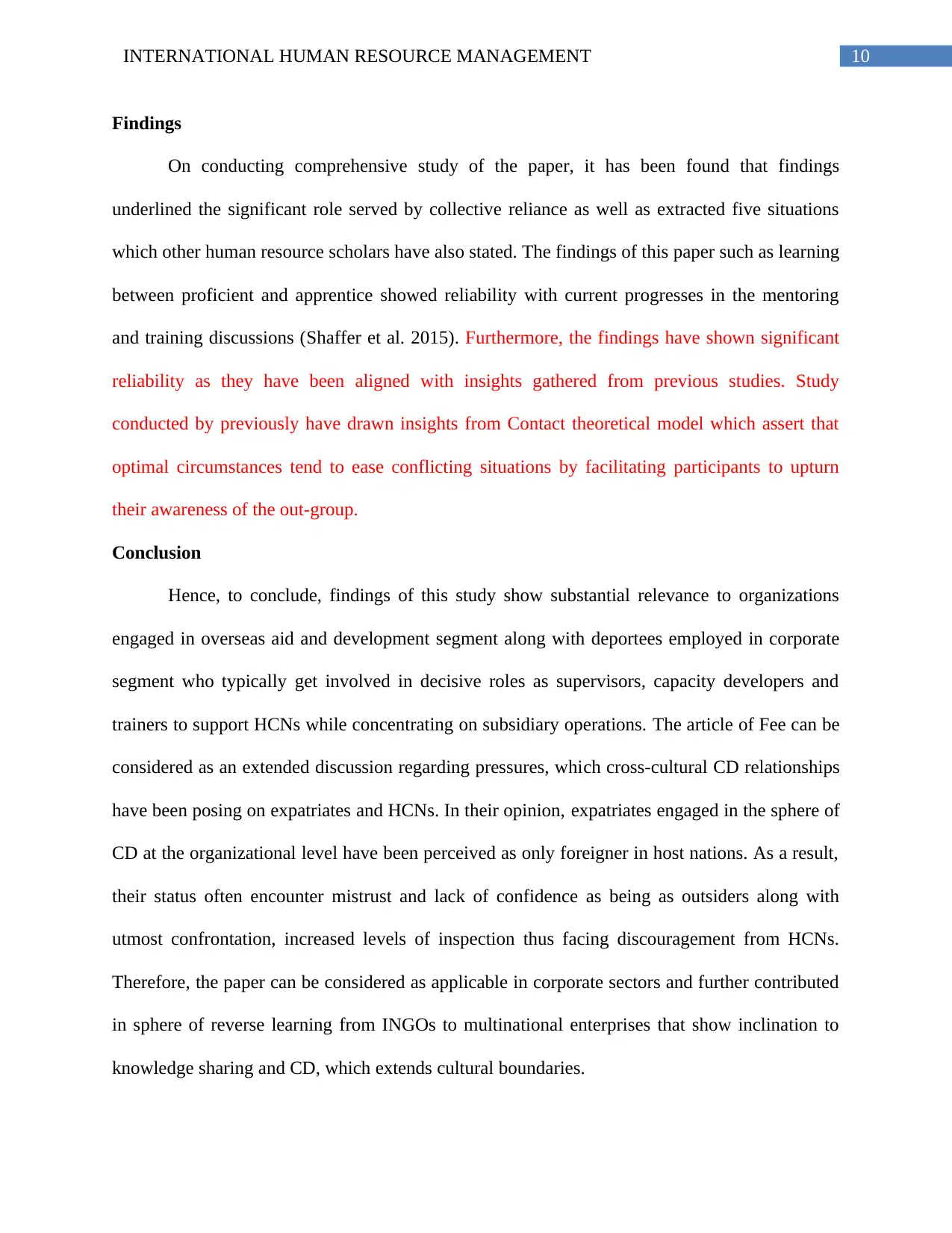
10INTERNATIONAL HUMAN RESOURCE MANAGEMENT
Findings
On conducting comprehensive study of the paper, it has been found that findings
underlined the significant role served by collective reliance as well as extracted five situations
which other human resource scholars have also stated. The findings of this paper such as learning
between proficient and apprentice showed reliability with current progresses in the mentoring
and training discussions (Shaffer et al. 2015). Furthermore, the findings have shown significant
reliability as they have been aligned with insights gathered from previous studies. Study
conducted by previously have drawn insights from Contact theoretical model which assert that
optimal circumstances tend to ease conflicting situations by facilitating participants to upturn
their awareness of the out-group.
Conclusion
Hence, to conclude, findings of this study show substantial relevance to organizations
engaged in overseas aid and development segment along with deportees employed in corporate
segment who typically get involved in decisive roles as supervisors, capacity developers and
trainers to support HCNs while concentrating on subsidiary operations. The article of Fee can be
considered as an extended discussion regarding pressures, which cross-cultural CD relationships
have been posing on expatriates and HCNs. In their opinion, expatriates engaged in the sphere of
CD at the organizational level have been perceived as only foreigner in host nations. As a result,
their status often encounter mistrust and lack of confidence as being as outsiders along with
utmost confrontation, increased levels of inspection thus facing discouragement from HCNs.
Therefore, the paper can be considered as applicable in corporate sectors and further contributed
in sphere of reverse learning from INGOs to multinational enterprises that show inclination to
knowledge sharing and CD, which extends cultural boundaries.
Findings
On conducting comprehensive study of the paper, it has been found that findings
underlined the significant role served by collective reliance as well as extracted five situations
which other human resource scholars have also stated. The findings of this paper such as learning
between proficient and apprentice showed reliability with current progresses in the mentoring
and training discussions (Shaffer et al. 2015). Furthermore, the findings have shown significant
reliability as they have been aligned with insights gathered from previous studies. Study
conducted by previously have drawn insights from Contact theoretical model which assert that
optimal circumstances tend to ease conflicting situations by facilitating participants to upturn
their awareness of the out-group.
Conclusion
Hence, to conclude, findings of this study show substantial relevance to organizations
engaged in overseas aid and development segment along with deportees employed in corporate
segment who typically get involved in decisive roles as supervisors, capacity developers and
trainers to support HCNs while concentrating on subsidiary operations. The article of Fee can be
considered as an extended discussion regarding pressures, which cross-cultural CD relationships
have been posing on expatriates and HCNs. In their opinion, expatriates engaged in the sphere of
CD at the organizational level have been perceived as only foreigner in host nations. As a result,
their status often encounter mistrust and lack of confidence as being as outsiders along with
utmost confrontation, increased levels of inspection thus facing discouragement from HCNs.
Therefore, the paper can be considered as applicable in corporate sectors and further contributed
in sphere of reverse learning from INGOs to multinational enterprises that show inclination to
knowledge sharing and CD, which extends cultural boundaries.
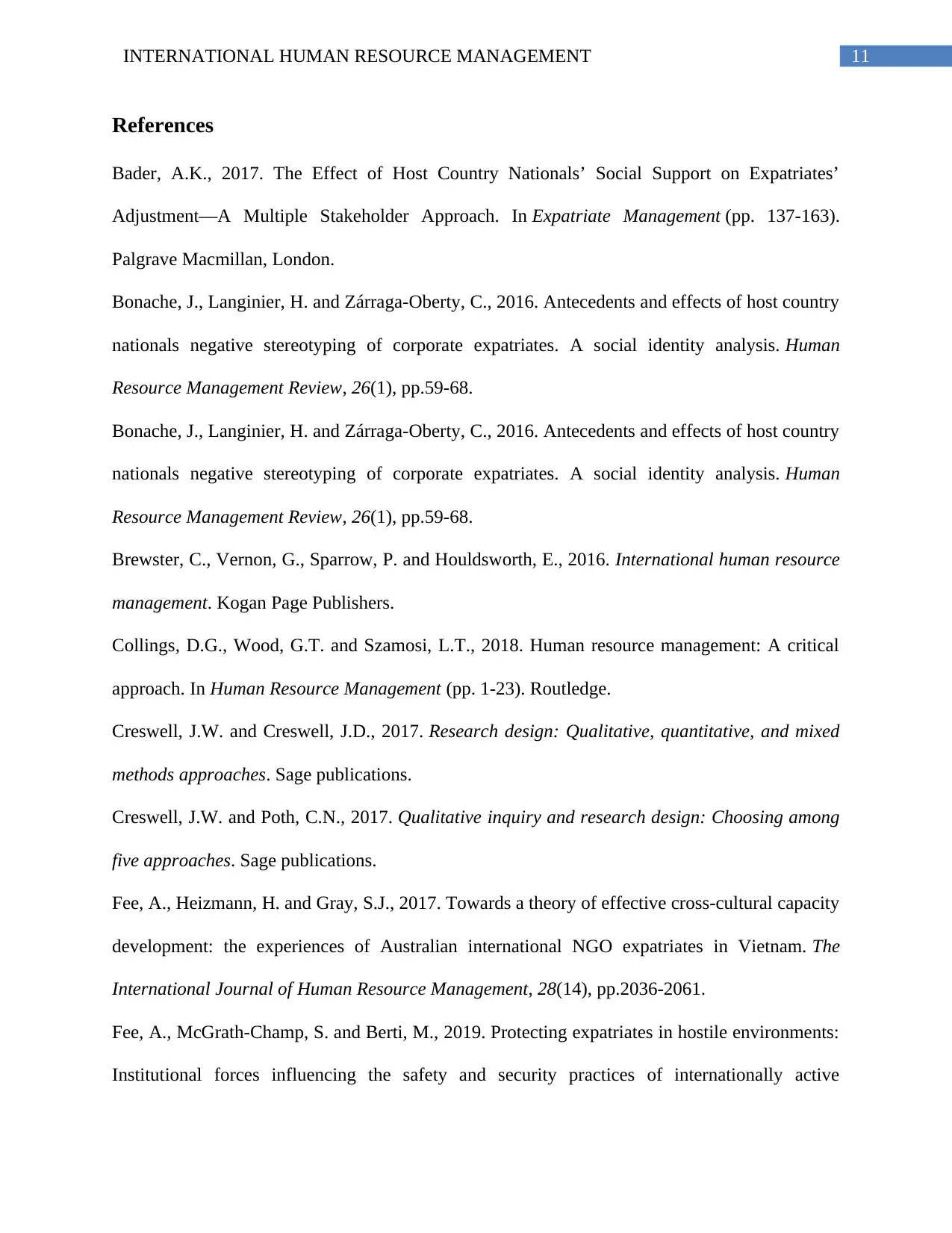
11INTERNATIONAL HUMAN RESOURCE MANAGEMENT
References
Bader, A.K., 2017. The Effect of Host Country Nationals’ Social Support on Expatriates’
Adjustment—A Multiple Stakeholder Approach. In Expatriate Management (pp. 137-163).
Palgrave Macmillan, London.
Bonache, J., Langinier, H. and Zárraga-Oberty, C., 2016. Antecedents and effects of host country
nationals negative stereotyping of corporate expatriates. A social identity analysis. Human
Resource Management Review, 26(1), pp.59-68.
Bonache, J., Langinier, H. and Zárraga-Oberty, C., 2016. Antecedents and effects of host country
nationals negative stereotyping of corporate expatriates. A social identity analysis. Human
Resource Management Review, 26(1), pp.59-68.
Brewster, C., Vernon, G., Sparrow, P. and Houldsworth, E., 2016. International human resource
management. Kogan Page Publishers.
Collings, D.G., Wood, G.T. and Szamosi, L.T., 2018. Human resource management: A critical
approach. In Human Resource Management (pp. 1-23). Routledge.
Creswell, J.W. and Creswell, J.D., 2017. Research design: Qualitative, quantitative, and mixed
methods approaches. Sage publications.
Creswell, J.W. and Poth, C.N., 2017. Qualitative inquiry and research design: Choosing among
five approaches. Sage publications.
Fee, A., Heizmann, H. and Gray, S.J., 2017. Towards a theory of effective cross-cultural capacity
development: the experiences of Australian international NGO expatriates in Vietnam. The
International Journal of Human Resource Management, 28(14), pp.2036-2061.
Fee, A., McGrath-Champ, S. and Berti, M., 2019. Protecting expatriates in hostile environments:
Institutional forces influencing the safety and security practices of internationally active
References
Bader, A.K., 2017. The Effect of Host Country Nationals’ Social Support on Expatriates’
Adjustment—A Multiple Stakeholder Approach. In Expatriate Management (pp. 137-163).
Palgrave Macmillan, London.
Bonache, J., Langinier, H. and Zárraga-Oberty, C., 2016. Antecedents and effects of host country
nationals negative stereotyping of corporate expatriates. A social identity analysis. Human
Resource Management Review, 26(1), pp.59-68.
Bonache, J., Langinier, H. and Zárraga-Oberty, C., 2016. Antecedents and effects of host country
nationals negative stereotyping of corporate expatriates. A social identity analysis. Human
Resource Management Review, 26(1), pp.59-68.
Brewster, C., Vernon, G., Sparrow, P. and Houldsworth, E., 2016. International human resource
management. Kogan Page Publishers.
Collings, D.G., Wood, G.T. and Szamosi, L.T., 2018. Human resource management: A critical
approach. In Human Resource Management (pp. 1-23). Routledge.
Creswell, J.W. and Creswell, J.D., 2017. Research design: Qualitative, quantitative, and mixed
methods approaches. Sage publications.
Creswell, J.W. and Poth, C.N., 2017. Qualitative inquiry and research design: Choosing among
five approaches. Sage publications.
Fee, A., Heizmann, H. and Gray, S.J., 2017. Towards a theory of effective cross-cultural capacity
development: the experiences of Australian international NGO expatriates in Vietnam. The
International Journal of Human Resource Management, 28(14), pp.2036-2061.
Fee, A., McGrath-Champ, S. and Berti, M., 2019. Protecting expatriates in hostile environments:
Institutional forces influencing the safety and security practices of internationally active
⊘ This is a preview!⊘
Do you want full access?
Subscribe today to unlock all pages.

Trusted by 1+ million students worldwide
1 out of 13
Related Documents
Your All-in-One AI-Powered Toolkit for Academic Success.
+13062052269
info@desklib.com
Available 24*7 on WhatsApp / Email
![[object Object]](/_next/static/media/star-bottom.7253800d.svg)
Unlock your academic potential
Copyright © 2020–2026 A2Z Services. All Rights Reserved. Developed and managed by ZUCOL.



